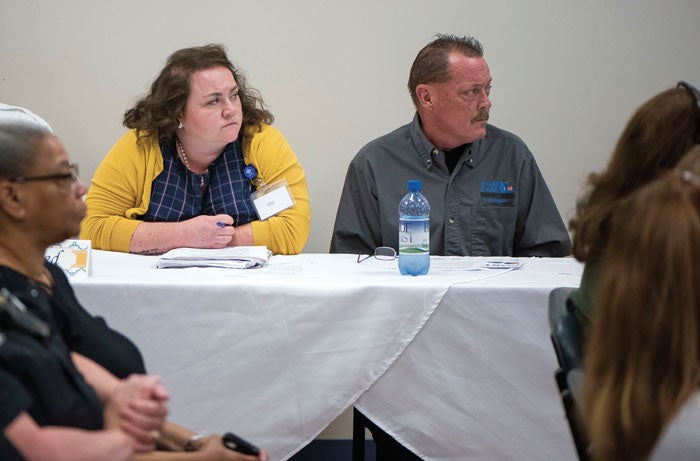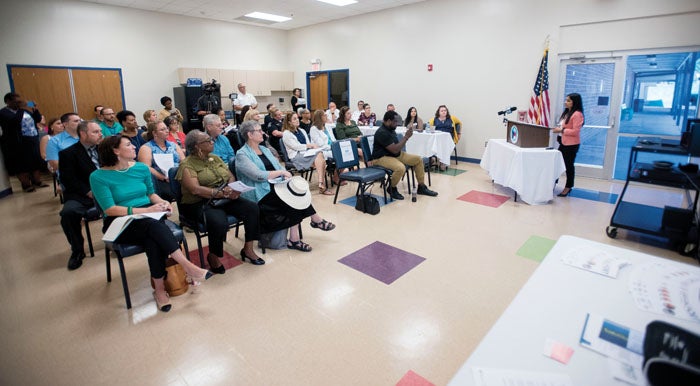Post Overdose Response Team unveiled
Published 12:00 am Friday, August 30, 2019
SALISBURY — Two weeks ago at the Rowan County Department of Social Services, a parent who was there with a child was found in the restroom unconscious after having taken drugs. The woman had to be revived using the opioid reversal drug Narcan.
It’s likely that within just 72 hours, the woman met with Jeff Brown, a community paramedic who is part of the Rowan County Post Overdose Response Team. The team also includes peer support specialist Ashley Creek and harm reduction advocate Neetu Verma.
The trio were on hand Thursday morning for a news conference to unveil the program that will operate in Rowan County under the Department of Public Health. Public Health Director Nina Oliver addressed the need for the program and shared with stakeholders the success of similar programs in other states and across North Carolina.
Also speaking were Emergency Medical Services Director Lennie Cooper, Emergency Services Chief Chris Soliz, and Dr. Anuradha Rao-Patel of Blue Cross and Blue Shield.
Earlier this year, Blue Cross gave five North Carolina organizations $2 million to address the opioid epidemic that plagues not only this state but the nation. The agencies were chosen for their work helping to prevent addiction, treat opioid dependency and transform communities at a local level. The grants are part of an initial $50 million Blue Cross N.C. provided beginning in 2018 to address community health initiatives in the state.
The Rowan County Department of Public Health received a $285,326 grant to implement the PORT program.
The selection of recipients was based on each organization’s ability to create system-level changes across prevention, treatment and recovery — which mirrors Blue Cross’ three-pronged approach to addressing the opioid epidemic, explained Rao-Patel, lead medical director for Blue Cross N.C.
The PORT program will offer coordinated support beyond initial intervention by providing supportive outreach to identified opioid users to help them in their journey toward becoming drug-free.
After an EMT or responder responds to an overdose, a community paramedic will offer additional support by referring the patient to other members of the team — a harm reduction advocate and a peer support specialist. The team will make multiple attempts to contact the patient and encourage him to enroll. The team will provide Naxolone kits and connections to support programs in Rowan County.
The team will make follow-ups with the client after one month, three months, six months and beyond, if needed. The goal is to reduce the number of overdose calls to EMS and visits to the emergency room.
The program was launched July 15. Since then, there have been 46 opioid overdoses in the county — all on heroin — which averages to about one overdose a day. Since the grant-funded program began, the team has responded to 16 of those 46 overdoses; 10 of them were fatal. The team made contact with eight of the 16 people, with half of them canceling appointments or disappearing.
Additionally, four of the eight scheduled follow-up appointments with the team, and three are currently in treatment or are receiving assistance to address their addiction.
Creek said she hopes that as the program continues, the stigma around addiction and substance use can dissipate and the program can address the shame that users feel. She said too many times, programs address only the symptoms not the problems behind opioid abuse, which in many cases involve a person who has experienced trauma in their lives.
Creek said she had a lot of emotional pain and childhood trauma and suffered from post-traumatic stress disorder, anxiety and depression. Later in life, she turned to alcohol and other substances. She said her parents also abused drugs and, in a way, she learned those behaviors from them. She said the good thing about the PORT program is it will reach people where they are.
In the past 45 days, Oliver said, improvements have been made in the PORT program, including that it will be discussed with all police chiefs in the county.
Creek volunteers at the Cabarrus Health Alliance’s syringe exchange program, which some Rowan County residents use. She would be able to make connections with users who take part in the needle exchange program. Oliver will also provide education on the program in the community, including at Rowan Helping Ministries’ homeless shelter.
A county GIS map and app were created to show the hardest-hit areas of opioid use. The map will not pinpoint a specific address but provide a general area of the most prevalent opioid use so the team can reach out to those communities.
Oliver said law enforcement agencies were invited to join the team to help identify “hot spots” because often, patients are revived by law officers before medical responders’ arrival.
She said recently, a person said he wanted to get help immediately, but transportation was an issue. She said PORT is hoping to partner with Daymark Recovery’s mobile crisis team to help with transportation.
Oliver said she knows some people won’t want help from PORT, but once they are revived by emergency responders they will still receive a Naloxone kit that has program contact information.
Three years ago, there were fewer than 100 children in the Rowan County foster care system; now there are more than 170 with the majority of them removed from their homes because their parents have problems with substance abuse, said Donna Fayko, director of the Rowan Department of Social Services.
Fayko applauded the PORT program and its community partners, adding she hopes funding will continue after the two-year grant ends.
Brown agreed, saying he hopes the county or other local entities will continue to support the program once the grant has expired.
Rowan County Commissioner Judy Klusman, who has been an advocate for the PORT program and on the issue of opioid abuse, said it is her desire to have the program continue beyond the two years and she hopes the county can help with that.
Salisbury Mayor Al Heggins, who also attended Thursday’s news conference, said that as the PORT program moves forward, it is her hope that municipalities will become funding partners “in preserving the lives of our residents and sustaining this program.”
For more information about the Post Overdose Response Team, to obtain a Narcan kit or for similar services and interventions, call 704-245-6521 and choose Option 3.
A resource guide for mental health, drugs and alcohol is available at the Rowan County Public Health Department website, https://www.rowancountync.gov/256/Health-Department. It provides a list of service and treatment providers in and near Rowan County.







